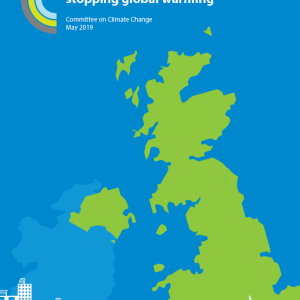
This report from the UK’s Committee on Climate Change sets out how the UK can reach net zero emissions by 2050 using existing technologies. It notes that current policies do not do enough to meet existing climate targets, and calls for “clear, stable and well-designed policies” to be introduced across the economy without delay. If replicated across the world, the plan would give a greater than 50% chance of limiting warming to 1.5°C.
The net zero target for greenhouse gas emissions is based on the UK’s ‘territorial’ emissions, i.e. emissions produced within the UK, rather than ‘consumption’ emissions, which would account for the emissions associated with producing goods that are imported to or exported from the UK. See p104 of the full report for further discussion of territorial versus consumption emissions. The net zero target also includes international aviation and shipping.
The report argues that the UK can and should reduce emissions by more than its per capita “fair share”, due to the UK’s large historical emissions and emissions associated with imports. It estimates that the costs of achieving net zero would be around 1-2% of GDP each year - roughly the same cost as a previous estimate for achieving an 80% reduction, due to falls in the costs of some low carbon technologies such as offshore wind and solar.
The report sets out different timelines for reaching net zero in each of the UK’s countries, concluding that Scotland has the capacity to reach net zero by 2045 rather than 2050, whereas Wales should aim for a 95% reduction in emissions by 2050 since it has lower capacity for carbon storage and has relatively high agricultural emissions that are difficult to mitigate.
FCRN readers may be particularly interested in the following recommendations related to the food and agricultural system:
- Reduce consumption of beef, lamb and dairy
- Reduce food waste
- Shift one fifth of the UK’s agricultural land to tree planting, energy crops and peatland restoration
The report assesses ‘Core’, ‘Further Ambition’ and ‘Speculative’ scenarios. The Core scenario, which would produce an 80% reduction in emissions by 2050, does not include dietary change.
The Further Ambition scenario, which would bring emissions down by 96%, assumes 20% lower consumption of beef, lamb and dairy. These foodstuffs would be replaced with pork, poultry and plant-based products. For more discussion of the relative costs and benefits of consuming different types of meat, see the FCRN reports How Low Can We Go? and Lean, green, mean, obscene…? What is efficiency? And is it sustainable?
The Speculative scenario includes a number of additional approaches that currently have either high costs, limited public acceptance or low levels of technical readiness. Some of these options (but not all) would be needed to reach 100% net emissions reduction. Included in this portfolio of speculative measures is a 50% decrease in beef, lamb and dairy consumption compared to current levels. This would be closer to, but still not in line with, current healthy eating guidelines.
See also the following media coverage, reactions and analysis:
- Carbon Brief: In-depth: The UK should reach ‘net-zero’ climate goal by 2050, says CCC
- Centre for Alternative Technology: Net zero – let’s up the ambition!
- Business Green: The net zero route map is clear - but are you ready for the journey of a lifetime?
- The Guardian: Let’s seize the moment and create a Green New Deal for the UK
- The Telegraph: Three cheers for the Climate Committee, but there is no 'cost' to zero emissions
Read the full report, Net Zero – The UK’s contribution to stopping global warming, here. View a summary presentation by the Committee on Climate Change here. See also the Foodsource chapter How can we reduce food-related greenhouse gas emissions?







Post a new comment »